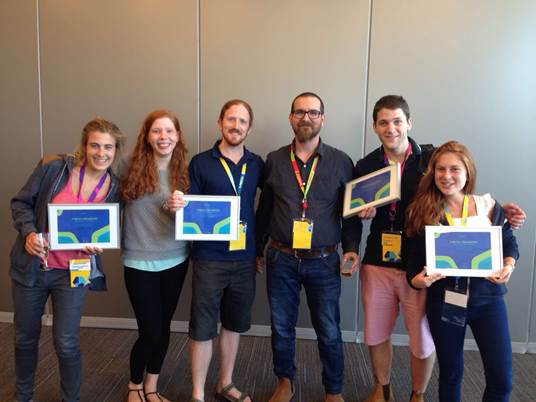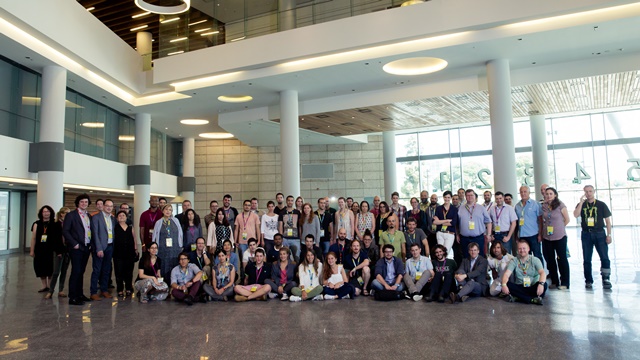
Fourth year Chemical Engineering student Gilad Belkin and his team (pictured above) presented their idea to the company after recently co-winning Merck’s first Hackathon in Israel and the second in the company’s history.
“The meeting went very well. Representatives from all of the winning teams presented their ideas at more length to an audience of Merck employees, including live video streaming to the company’s offices in Germany,” says Gilad, “They seemed to be quite impressed by our idea. The meeting also included presentations by Merck employees from the different departments, and a short tour of the research facility.”
Belkin and his teammates from the Weizmann Institute of Science, Bar-Ilan University and Ariel University managed in one night to go from idea to proof of concept. Their invention, Dropit, would turn your smartphone into an immediate allergen tester through the use of a simple microplate reader based assays from Merck. While many laboratories feature such analyzers, no one is carrying them around in their pockets. At least, not yet.
Belkin and his team were able to create an app that successfully distinguished between substances by the end of the night. Future potential home uses include distinguishing nut or dairy ingredients in food right at the dinner table. The eclectic group contained students majoring in chemistry, biology and computer science and hailing from Israel, France and Italy.
“It was really fun and the group had a good vibe. By the end of the night, we already had our private jokes,” said Belkin. “Merck was really supportive. They gave us everything we needed and it was a really positive atmosphere. It was my first hack-a-thon so I was a little surprised that it was not a pressured atmosphere at all. The emphasis was on being creative,” he added.
Belkin was informed by Prof. Moshe Gottlieb of the Department of Chemical Engineering about the upcoming hack-a-thon and decided to participate to “broaden my horizons.”
“It feels good having a big company appreciate your idea. It gives me confidence and makes me feel like it wasn’t just another competition,” Belkin reflected. He is also proud of coming up with the name for the app: Dropit. It’s a double entendre: drop some chemical analyzer on the sample and drop the food if you are allergic to it.
"Dropit", one of the two winning applications, was developed by Gilad Belkin (Ben-Gurion University), Sivan Biham (Bar Ilan University), Amaranta Kahn (Weizmann Institute of Science), Haim Schlesinger (Ariel University) and Michal Somekh (Bar Ilan University). Their solution presented a kit composed of ELISA plate, filtering columns, s and enzymes as well as a smartphone app that analyzed the resulting color changes in the microplate wells. By capturing an image of the plate, identifying the colors of the wells and comparing them to a pre-defined table, analytical values can be determined in the field with no other tools necessary.
Another BGU student, David Ben-Shlomo, also from the Department of Chemical Engineering, came in third place working on smart lighting, presenting novel uses of “steerable lighting”, which enables better focus and direction of light through non-mechanical means. The proposed solution may be helpful in operating rooms in hospitals, in underwater diving operations, and for soldiers performing missions in poorly-illuminated surroundings. This team included Ben-Shlomo, Nicole Leder (Bar Ilan University) and Sharon Lim Ming Wei (Tel Aviv University).
The event is one of a series of programs provided by the company to promote innovation and collaboration including the incubator operating in Yavne, Israel, and Merck's Innovation Center in Darmstadt, Germany.

